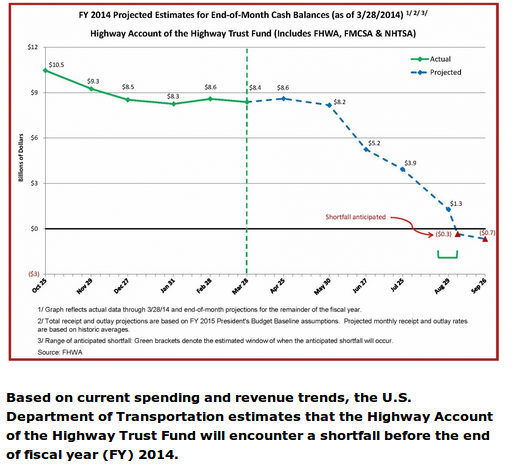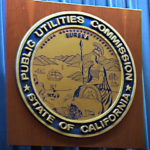The U.S. is saddled with an extensive highway system and a car-dominated transportation landscape. Under current policies the federal Highway Trust Fund is the primary funding source for the Interstate Highway System, and it’s about to run out of money. The balance will go to $0 by July or August 2014 unless Congress acts, but that’s unlikely given gridlock conditions in Washington. That’s political gridlock, not the kind of gridlock that prevents Congresspersons from getting to Capitol Hill.
An empty highway trust fund means the federal government won’t be able to send money to state transportation agencies to fund the highway system. While that won’t immediately halt interstate highway travel, it would throw a monkey wrench into any current projects, and threatens long-term issues like maintenance of the highway system. That means widespread decay of interstate highways because of deferred maintenance won’t be remedied anytime soon.
If this pattern continues, and the highways are no longer maintained (repaired, and upgraded), they’ll eventually crumble to a state of being unusable.
What would America be without its highway system?
It’s unlikely things will get that far, because Americans seem to be too addicted to cars and big highways to let it happen. According to the Highway Trust Fund Ticker![]() , it already received a $9.6 billion infusion this year, and apparently receives routine injections of money from the general fund. I wonder whether the highway system is the best use of America’s wealth, or whether an extensive rail system would take some heat off the perceived need of a big highway system?
, it already received a $9.6 billion infusion this year, and apparently receives routine injections of money from the general fund. I wonder whether the highway system is the best use of America’s wealth, or whether an extensive rail system would take some heat off the perceived need of a big highway system?
The fact is that our forefathers saddled the U.S. with the expense of building and maintaining a big highway system. Either we figure out how to continue paying for it, or we let it crumble and start building a different system that’s more cost effective.
In some quarters the highway system funding shortfall is blamed on fuel efficient cars, or electric cars. That’s because the funding comes from gasoline taxes. Cars that consume less gasoline per vehicle mile traveled contribute less highway funding than the inefficient cars.
That’s what is behind the push to enact taxes on electric cars. Electric car owners don’t contribute anything to the highway fund, but they still cause wear and tear to the roads. The question would be how to collect such a tax. And a bigger question is whether electric cars are the correct culprit?
The gasoline tax has remained at 18.4 cents per gallon since 1993. Inflation has eroded the value of that money while raising highway maintenance costs. Is the real culprit a lack of political fortitude that’d be required to change the gasoline tax?
Even if there were political fortitude to do so, the long term trend is towards fuel efficient cars. While that’s great for us environmentally, it means the gasoline tax is less and less effective a way to fund the highway system.
Why are highway funds needed at all? Aren’t the roads already paid for? Yes, but…. As any other thing in the manifest universe, highways crumble through use and through weather. The yearly cycle of winter and summer means highways expand and contract, causing damage to the roads. There’s also the continual need for new roads because we’re so addicted to driving cars on highways. Hence, there’s a continual need for highway funds.
Since the gasoline tax is becoming ineffective as a funding source, what other mechanism could be found?
A flat tax per year per vehicle is interesting, but it doesn’t connect the amount paid by each individual to their use of the roads. The gasoline tax did mean those who traveled more paid more in highway taxes.
One proposal is to implement an electric/digital tolling system. Rather than force people to stop in toll booths and drop quarters into a slot, the toll would be collected electronically as cars whizzed by.
The implementation would be similar to the RFID thingies used in some areas to collect highway tolls, or special fees for high occupancy lanes. If every car had one of those thingies, and they were connected in a nationwide system, then tolls could be collected and distributed directly from drivers and it would be based on their actual usage of the highways.
Current policies would have to be changed to allow tolls on the interstate highway system.
Even bigger is the “Big Brother” aspects of such a system, because the government would immediately know where we’re driving and all our travels.
Another option is to fundamentally change the transportation system. Rather than relying on cars and expensive highways, why not rely more on mass transit systems?
- Highway design could decrease death and injury risk, if “we” chose smarter designs - March 28, 2015
- GM really did trademark “range anxiety”, only later to abandon that mark - March 25, 2015
- US Government releases new regulations on hydraulic fracturing, that some call “toothless” - March 20, 2015
- Tesla Motors magic pill to solve range anxiety doesn’t quite instill range confidence - March 19, 2015
- Update on Galena IL oil train – 21 cars involved, which were the supposedly safer CP1232 design - March 7, 2015
- Another oil bomb train – why are they shipping crude oil by train? – Symptoms of fossil fuel addiction - March 6, 2015
- Chevron relinquishes fracking in Romania, as part of broader pull-out from Eastern European fracking operations - February 22, 2015
- Answer anti- electric car articles with truth and pride – truth outshines all distortions - February 19, 2015
- Apple taking big risk on developing a car? Please, Apple, don’t go there! - February 16, 2015
- Toyota, Nissan, Honda working on Japanese fuel cell infrastructure for Japanese government - February 12, 2015














